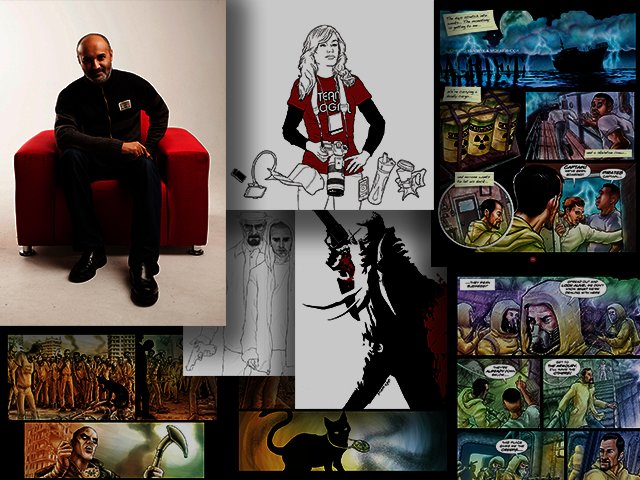The Comic Book Guys: Moray Rhoda
By Mike Joubert 15 January 2015 | Categories: interviews
As far at the local comic book scene goes, one guy has been working extremely hard at pushing it forward – our very own comic book guru Moray Rhoda. We tracked him down for a long overdue interview.
TS: You have done a lot of heavy lifting in order to lift the local comic book scene. Where do you think the scene is right now, and what needs to happen to take it to the next level?
MR: Right now is definitely the best time for SA comics in terms of amount of books out there, the vast genres covered and the quality levels of locally produced books – both in terms of art and printing. A few local artists and writers are also managing to build international careers doing comics and I fully expect more locals to make that breakthrough. There are also more events around comics and pop culture every year, which enables comic creators to build a local audience.
I’ve given up on any local publishers ever being anything but stupidly myopic in terms of what they believe will sell, but one thing that could help the local scene would be an invested local publisher with a global game plan. Local comic creators should also not get so caught up in the local fan service that they forget to look at international audiences.
The biggest thing that would help though, is for local comic creators to realise that even though our art is on an international level, local writing and storytelling in comics is generally as bad as our art was in the late 80s, early 90s. They need to fix this and spend as much time on the writing as they do on artwork or on marketing themselves.
.jpg)
TS: What is your goal regarding your own comic book creation?
With the best intentions I always vow (or threaten) that this year I’ll work on my own comic projects and spend less time managing events or organising publications, and each year I don’t get there. So the simple answer is – I am working on a few projects with other comic folks and all things being equal those projects are aimed at public launches from June 2015 onwards.
TS: What are some of the projects you are currently busy with?
In terms of organising things, I am planning SA Comics at Design Indaba 2015 along with Ray Whitcher from Legion Ink. As always, I am also moving things along in the production process of the next Velocity. Because I seem to be doing a lot of workshops, I will be spending a sizable chunk of my time in formalising those workshops and my thoughts about storytelling in comics over the next few months. This would be based on my practical experience and collaborations with artists and writers, as well as my observations of certain shortcomings in local storytelling and also very much based on the type of questions I get in workshops.
In terms of comics, I will be writing the next installment of The Lil 5 comic (www.lilfive.com) and doing art for a story by Christo van Wyk. I am also working with a few other local creators on a long-term new comic project for launch in mid 2015.
.jpg)
TS: Favourite artist?
Too many to count. Bryan Hitch has always been a favourite but I also like Eric Powell, Nicholas Kole, Sean Gordon Murphy, Ryan Ottley, Greg Capullo, Stuart Immonen and Luke Mancini. Right at this moment, probably James Harren and Joe Querio are top of my list.
TS: Favourite publisher?
Marvel. I have always been a Marvel Zombie, but Image is definitely rising in my estimation with the type of books they’re doing.
TS: Favourite comic book character?
I’m Batman.
.jpg)
TS: Any advice for folks starting off in comic book creation?
Don’t just read comics. By that I mean:
1) One needs to dissect and interrogate comics, not just enjoy and discard them. What makes the combination of words and pictures work?; why do certain characters or genres appeal more?; how are the plots constructed?; how do you write effective dialogue when each speech bubble generally can’t contain more than three sentences?
Take everything apart, even if you have to be as pedantic as to work out mathematical equations to determine what fraction of a comic book is taken up by action, dialogue or exposition. Understanding Comics by Scott McCloud is a good place to start.
2) One should also read “real” books. Read fiction, read non-fiction. Watch movies and TV series and ask yourself the same questions as above about narrative flow, plot structure, plot devices, dialogue, restrictions in genres and so on. Educate yourself on aspects of writing.
3) If you’re an artist – learn how to draw. And once you can draw, learn how to draw sequentially. Once again Scott McCloud comes to mind with Making Comics.
It sounds boring but it will make you a better storyteller. Then the last best advice I have is: produce something, put it (and yourself) out there for the world to comment on. You will learn more by doing than you could ever learn on the internet, in workshops or through studying comics.
TS: So when will the next Velocity appear?
Velocity 5 is in the production process with artists already working on their stories. Some have in actual fact already finished their artwork and handed that in. We try to aim Velocity launches as events, so at this point we are aiming at the first weekend in May, at Free Comic Day.
.jpg)
All images courtesy Moray Rhoda. Photo in collage courtesy of Danie Nel Photography. Article first appeared in TechSmart 136, Jan 2015 to read or download here.
Most Read Articles

Have Your Say
What new tech or developments are you most anticipating this year?



